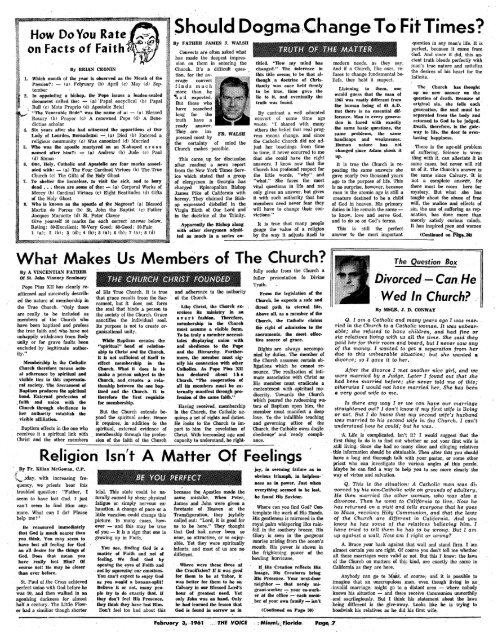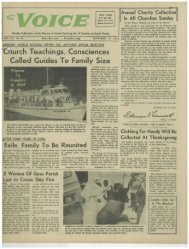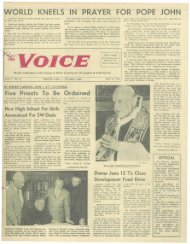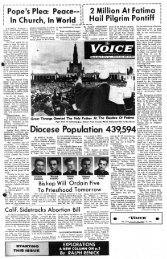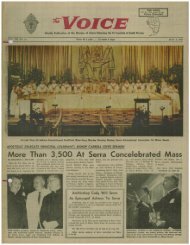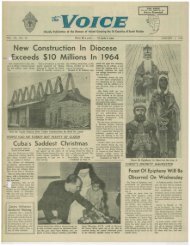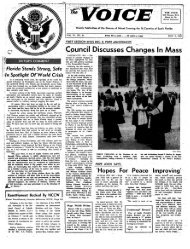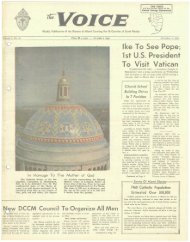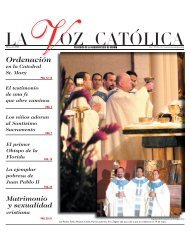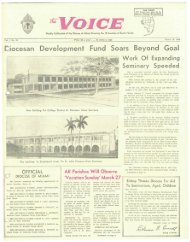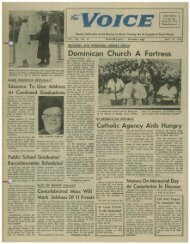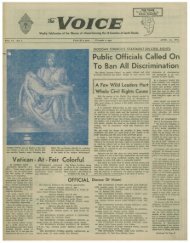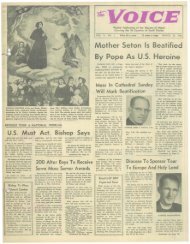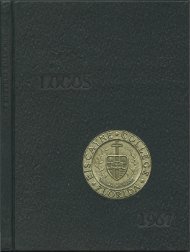02-03-1961 - E-Research
02-03-1961 - E-Research
02-03-1961 - E-Research
Create successful ePaper yourself
Turn your PDF publications into a flip-book with our unique Google optimized e-Paper software.
How Do You Rate<br />
on Facts of Faith<br />
By BRIAN CRONIN<br />
1. Which month of the year is observed as the Month of the<br />
Passion: — (a) February (b) April (c) May (d) September<br />
' •<br />
In appointing a bishop, the Pope issues a leaden-sealed<br />
document called the: — (a)"Papal encyclical (b) Papal<br />
Bull (c) Motu Proprio (d) Apostolic Brief<br />
"The Venerable Bede" was the name of a: — (a) Blessed<br />
Rosary (b) Prayer (c) A renowned Pope (d) A Benedictine<br />
scholar<br />
V-<br />
4. Six years after she had witnessed the apparitions of Our<br />
Lady of Lourdes, Bernadette: — x (a) Died (b) Entered a<br />
religious community (c) Was canonized (d) Married<br />
5. Who was the apostle martyred on an X-shaped cross<br />
named after him: — (a) Andrew (b) Jude (c) Paul<br />
(d) Simon<br />
6. One, Holy, Catholic and Apostolic are four marks associated<br />
with: — (a) The Four Cardinal Virtues (b) The.True<br />
Church (c) The Gifts of the Holy Ghost<br />
7. To shelter the homeless, to visit the sick, and to bury<br />
dead . . . these are .some of the: — (a) Corporal Works of<br />
Mercy (b) Cardinal Virtues (c) Eight Beatitudes (d) Gifts<br />
of the Holy Ghost<br />
8. Who is known as the apostle of the Negroes (a) Blessed<br />
Martin de Porres (b) St. John the Baptist (c) Father<br />
Jacques Maruette (d) St. Peter Claver<br />
Give yourself 10 marks for each correct answer below.<br />
Rating: 80-Excellent; 70-Very Good; 60-Good; 50-Fair<br />
1 (a); 2 (b); 3 (d); 4 (b); 5 (a); 6 (b); 7 (a); 8 (d)<br />
Should DogmiaChangeToFif Times<br />
By FATHER JAMES J. WALSH<br />
Converts are often asked what<br />
has made the deepest impression<br />
on them in entering the<br />
Church. It's a difficult ques-\<br />
tion, for the average<br />
convert<br />
finds much<br />
more than he<br />
% a d, expected.<br />
But those who<br />
have searched<br />
long for • the<br />
truth have a<br />
ready answer.<br />
They are impressed<br />
most by<br />
FR. WALSH<br />
the certainty of mind the<br />
Church makes possible.<br />
This came x up for discussion<br />
after reading a news report<br />
from the New York Times Service<br />
which stated that a group<br />
of clergymen in Georgia has<br />
charged Episcopalian Bishop<br />
James Pike of California with<br />
heresy. They claimed the Bishop<br />
expressed disbelief in the<br />
Virgin Birth of Our Lord and<br />
in the doctrine of the Trinity.<br />
Apparently the Bishop along<br />
with other clergymen admitted<br />
as much in a series entitled,<br />
"How my mind has<br />
changed." The inference in<br />
this title seems, to be that although<br />
a doctrine of Christianity<br />
was once held firmly<br />
to be true, time gave the<br />
lie to it, and eventually the<br />
truth was found.<br />
By contrast a well educated<br />
convert of some time ago<br />
wrote: "I shared with many<br />
others the belief that real progress<br />
means change, and since<br />
the Catholic Church did not adjust<br />
her teachings from time<br />
to time, it never occurred to me<br />
that she could have the right<br />
answers. I know now that the<br />
Church has profound respect for<br />
the little words, "why" and<br />
"what." She faces the most<br />
Vital questions in life and not<br />
only gives an answer, but gives<br />
it with such authority that her<br />
members need never fear they<br />
will have to change their convictions."<br />
It is true that many people<br />
gauge the value of a religion<br />
by the way it adjusts itself to<br />
modern needs, ;as they say.<br />
And if a Church, like ours, refuses<br />
to change fundamental beliefs,<br />
they hold it suspect.<br />
Listening to them, one<br />
would guess that the man of<br />
. <strong>1961</strong> was vastly different from<br />
the human being of 61 A.D.<br />
But there is no essential difference.<br />
Man in every generation<br />
is faced with exactly<br />
the same basic questions, the<br />
same problems, the same<br />
handicaps and weaknesses.<br />
Human nature has not<br />
changed since Adam shook it<br />
up.<br />
It is true the Church is repeating<br />
the same answers she<br />
gave nearly two thousand years<br />
ago to the purpose of life. This<br />
is no surprise, however, because<br />
man in the atomic age is still a<br />
creature destined to be a child<br />
of God in heaven. His primary<br />
duties in life remain the same —<br />
to know, love and serve God,<br />
and to do so on God's terms.<br />
This is still the perfect<br />
answer to the most important<br />
question in any man's life. It is<br />
perfect, because it came from<br />
God. And since it did, this ancient<br />
truth blends perfectly with<br />
man's true nature and satisfies<br />
the desires of his heart for the<br />
Infinite.<br />
The Church has thought<br />
up no new answer on the<br />
question of death. Because of<br />
original sin, she tells each<br />
generation, the soul must be<br />
separated from the body and<br />
returned to God to be judged.<br />
.Death, therefore, is the gateway<br />
to life, the door to everlasting<br />
happiness.<br />
There is the age-old problem<br />
of suffering. Science is wrestling<br />
with it, can alleviate it in<br />
some cases, but never will rid<br />
us of it. The Church's answer is<br />
the same since Calvary. v It is<br />
not a complete answer, for<br />
there must be room here for<br />
mystery. But what she has<br />
taught' about the abuse of free<br />
will, the malice and effects of<br />
sin, the use of suffering as reparation,<br />
has done more than<br />
merely satisfy curious minds.<br />
It has inspired jnen and women<br />
(Continued on<br />
What Makes Us Members of The Church<br />
By A VINCENTIAN FATHER<br />
Of St. John Vianney Seminary<br />
Pope Pius XII has clearly reaffirmed<br />
and succinctly described<br />
the nature of membership in<br />
the True Church. "Only those<br />
are really . to be included as<br />
members of the Church who<br />
have been baptized and profess<br />
the true faith and who have not<br />
unhappily withdrawn from Body<br />
unity or for grave faults been<br />
excluded by legitimate authority."<br />
Membership in the Catholic<br />
Church therefore means actual<br />
adherence by spiritual and<br />
visible ties to this supernatural<br />
society. The Sacrament of<br />
Baptism produces the spiritual<br />
bond. External profession of<br />
, faith and union with the<br />
Church through obedience to<br />
her authority establish the<br />
visible affiliation.<br />
Baptism effects in the one who<br />
receives it a spiritual link with<br />
Christ and the other members<br />
of His True Church. It is true<br />
that grace results from the Sacrament,<br />
but it does, not form<br />
the seal that binds a person to<br />
the society of the Church. Grace<br />
sanctifies the individual soul.<br />
Its purpose is not to create organizational<br />
unity.<br />
While Baptism creates the<br />
"spiritual" bond of relationship<br />
to Christ and the Church,<br />
it is not sufficient of itself to<br />
effect membership in the<br />
Church. What it does is to<br />
make a person subject to the<br />
Church, and creates a relationship<br />
between the one baptized<br />
and the Church. It is<br />
therefore the first requisite<br />
for membership.<br />
But the Church extends beyond<br />
the spiritual order. Hence<br />
it requires, in addition to the<br />
spiritual, external evidence of<br />
membership through the profession<br />
of the faith of the Church<br />
and adherence to the authority<br />
pf the Church. ^<br />
Like Christ, the Church exercises<br />
its ministry in an<br />
overt fashion. Therefore,<br />
membership in the Church<br />
must assume a visible form.<br />
To be truly a member necessitates<br />
displaying union with<br />
and obedience to the Pope<br />
and the Hierarchy. Furthermore,<br />
the member must signify<br />
his connection with other<br />
Catholics. As Pope Pius XII<br />
has declared about the<br />
Church. "The cooperation of<br />
all its members must be externally<br />
manifest through profession<br />
of the same faith."<br />
Having received, membership<br />
to the Church, the Catholic acquires<br />
a set of rights and duties.<br />
He looks to the Church to impart<br />
to him the revelation of<br />
Christ. With increasing age and<br />
capacity to understand, he rightfully<br />
seeks from the Church a<br />
fuller presentation fo Divine<br />
Truth.<br />
From the legislation of the<br />
Church, he expects a safe and<br />
direct path to eternal life.<br />
Above all, as a member of the<br />
Church, the Catholic claims<br />
the right of admission to the<br />
sacraments, the most - effective<br />
source of grace.<br />
Religion Isn't A Matter Of Feelings<br />
By Fr. Kilian McGowan, C.P.<br />
Rights are always accompanied<br />
by duties. The member of<br />
the Church assumes certain obligations<br />
which he cannot renounce.<br />
The realization of intimate<br />
association with Christ as<br />
(His member must eradicate a<br />
contentment with spiritual mediocrity.<br />
Towards the Church<br />
which poured the redeeming waters<br />
of Baptism upon him, the<br />
member must manifest a deep<br />
love. To-the infallible teaching<br />
and governing office of the<br />
Church, the Catholic owes docjle<br />
obedience' and ready compliance.<br />
1^/Jday, with increasing frequency,<br />
we priests hear this<br />
troubled question: "Father, I<br />
seem to have lost God. I just<br />
can't seem to find Him anymore.<br />
What can I do Please<br />
help me!''<br />
Be reassured immediately<br />
that God is much nearer than<br />
you think. You may seem to<br />
have lost all feeling for God<br />
an all desire for the things of<br />
God. Does that mean you<br />
have really lost Him Of<br />
course not! He may be closer<br />
than ever before.<br />
St. Paul of .the Cross achieved<br />
perfect union with God before he<br />
was 30, and then walked in an<br />
agonizing darkness for almost<br />
half a century. The Little Flower<br />
had a similiar though shorter<br />
trial. This stale could be naturally<br />
caused by sheer physical<br />
fatigue or- simply nervous exhaustion.<br />
A change of pace or a<br />
little vacation could change this<br />
picture. In many cases, however<br />
— and this may be true<br />
of you — it is a sign that one is<br />
growing up in Faith.<br />
You see, finding God is a<br />
matter of Faith and not of<br />
feeling. We find God by<br />
opening the eyes of Faith and<br />
- not by squeezing our emotions.<br />
You can't expect to enjoy God<br />
as you would a banana-split!<br />
Believe it or not, many people<br />
try to do exactly that. If<br />
they don't feel His Presence,<br />
they think they have lost Him.<br />
Don't feel too bad about this<br />
because the. Apostles made the<br />
same mistake. When Peter,<br />
James and John were given a<br />
foretaste of Heaven at the<br />
Transfiguration, they joyfully<br />
called out: "Lord, it is good for<br />
us to be here." They thought<br />
that God had never been so<br />
near, so attractive, or so enjoyable.<br />
Yet they were spiritually<br />
infants, and most of us are no<br />
different.<br />
Where were these three at<br />
the Crucifixion If it was good<br />
for them to be at Tabor, it<br />
was better for them to be on<br />
Calvary in our Blessed Lord's<br />
hour of greatest need. Yet<br />
only John was on hand. Onlyhe<br />
had learned the lesson that<br />
God is found in sorrow as in<br />
joy, in seeming failure as in<br />
obvious triumph, in helplessness<br />
as in power. Just when<br />
everything seemed to be lost,<br />
he found His Saviour.<br />
Where can you find God Contemplate<br />
the work of His Hands.<br />
His gentleness is mirrored in the<br />
royal palm whispering like rainfall<br />
in the southery breeze. His<br />
Glory is seen in the gorgeous<br />
sunrise arising from the ocean's<br />
mouth. His power is shown in<br />
the frightening power of the<br />
howling hurricane.<br />
If His Creation reflects His<br />
Image, His Creatures bring<br />
His Presence. Your next-door<br />
neighbor — that needy migrant-worker<br />
— your co-worker<br />
at the office.— each member<br />
of your own family — isn't<br />
(Continued on Page 30)<br />
February 3, <strong>1961</strong> THE VOICE Miami,, Florida Pag& 7<br />
The Question Box<br />
Divorced — Can He<br />
Wed In Church<br />
By MSGR. J.. D. CONWAY<br />
Q. I am a Catholic and many years ago I was married<br />
in the Church to a Catholic woman. It was unbearable;<br />
she refused to have children, and had five or<br />
six relatives living with us all the time. She said they<br />
paid her for their room and board, but I never saw any<br />
of the money. I wanted to get a separation from her<br />
due to this unbearable situation; but she wanted a<br />
divorce; so 1 gave it to her.<br />
After the divorce I met another nice girl, and we<br />
were married by a Judge. Later I found out that she<br />
had been married before; sKe- never told me of this;<br />
otherwise I would not have married her. She has been<br />
. a very good wife to me.<br />
Is there any way I or we can have our marriage<br />
straightened out I don't know if my first wife is living<br />
or not. But I do know that my second wife's husband<br />
was married to his second wife in the Church. I can't<br />
understand how he could; but he was.<br />
)•<br />
•A. Life is complicated, isn't it I would suggest that the<br />
first thing to do is to find out whether or not your first wife is<br />
still living. Since she had so many close and clinging relatives<br />
•this information should be obtainable. Then after that you should<br />
have a long and thorough talk with your pastor, or some other<br />
priest who can investigate the various angles ^of this puzzle.<br />
Maybe he can find a way to help you to see more clearly the<br />
way of virtue and salvation.<br />
Q. This is the situation: A Catholic man was divorced<br />
by his non-Catholic wife on grounds of adultery.<br />
He then married the other womant who was also a<br />
divorcee. Then he went to California to live. Now he<br />
has returned on a visit and tells everyone that he goes<br />
to Mass, receives Holy Communion, and that the laws<br />
of the Church are different in California. And you<br />
know he has some of the relatives believing him. I<br />
have tried to tell them he has to be wrong. But I. am<br />
up against a wall. Now am I right or wrong<br />
A. Brace your back against that wall and stand firm. I am<br />
almost certain you are right. Of course you don't tell me whether .<br />
all these marriages were valid or not. But this I know: the laws<br />
of the Church on matters of this kind, are exactly the same in<br />
California as they are here.<br />
Anybody can go to Maes, of course; arid it is possible to<br />
imagine that an unscrupulous man, even though living in an<br />
- invalid marriage, might go to a distant area — where nobody<br />
knows his situation — and there receive Communion unworthily<br />
and sacrilegiously. But I think his statement about the laws<br />
being different is the give-away. Looks like he is trying to<br />
hoodwink his relatives as he. did his first wife.


